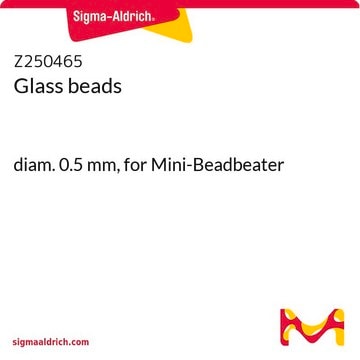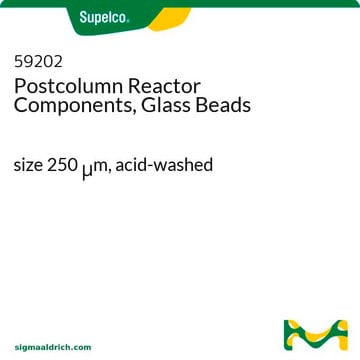G1145
Glass beads, acid-washed
150-212 μm (70-100 U.S. sieve)
Synonym(s):
Glass Beads
Sign Into View Organizational & Contract Pricing
All Photos(2)
About This Item
UNSPSC Code:
41102422
NACRES:
NB.22
Recommended Products
particle size
150-212 μm (70-100 U.S. sieve)
Application
Acid-washed glass beads have been used:
- in the lysis of yeast colonies to produce a yeast two-hybrid screen
- in the extraction of DNA from Penicillium roqueforti mycelial samples
- in disruption of Streptococcus thermophilus and Lactobacillus delbrueckii subsp. bulgaricus strains for determining the enzyme activity
Storage Class Code
11 - Combustible Solids
WGK
nwg
Flash Point(F)
Not applicable
Flash Point(C)
Not applicable
Personal Protective Equipment
dust mask type N95 (US), Eyeshields, Gloves
Certificates of Analysis (COA)
Search for Certificates of Analysis (COA) by entering the products Lot/Batch Number. Lot and Batch Numbers can be found on a product’s label following the words ‘Lot’ or ‘Batch’.
Already Own This Product?
Find documentation for the products that you have recently purchased in the Document Library.
Customers Also Viewed
Kim I Sørensen et al.
Applied and environmental microbiology, 82(12), 3683-3692 (2016-04-24)
Streptococcus thermophilus and Lactobacillus delbrueckii subsp. bulgaricus are used in the fermentation of milk to produce yoghurt. These species normally metabolize only the glucose moiety of lactose, secreting galactose and producing lactic acid as the main metabolic end product. We
Dylan Dodd et al.
Nature, 551(7682), 648-652 (2017-11-24)
The human gut microbiota produces dozens of metabolites that accumulate in the bloodstream, where they can have systemic effects on the host. Although these small molecules commonly reach concentrations similar to those achieved by pharmaceutical agents, remarkably little is known
Roger Karlsson et al.
PloS one, 13(12), e0208804-e0208804 (2018-12-12)
A range of methodologies may be used for analyzing bacteria, depending on the purpose and the level of resolution needed. The capability for recognition of species distinctions within the complex spectrum of bacterial diversity is necessary for progress in microbiological
Julie S Do et al.
PloS one, 9(1), e86433-e86433 (2014-01-28)
Molecular viability testing (MVT) was previously reported to specifically detect viable bacterial cells in complex samples. In MVT, brief nutritional stimulation induces viable cells, but not non-viable cells, to produce abundant amounts of species-specific ribosomal RNA precursors (pre-rRNA). Quantitative polymerase
Differentiation of Penicillium roqueforti from Closely Related Species Contaminating Cheeses and Dairy Environment
Kavkova M, et al.
Fermentation, 7(4), 222-222 (2021)
Our team of scientists has experience in all areas of research including Life Science, Material Science, Chemical Synthesis, Chromatography, Analytical and many others.
Contact Technical Service












